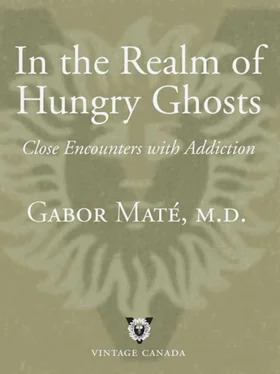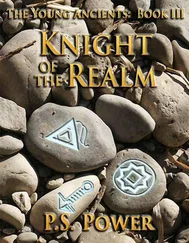Although I have not been an active participant in Twelve-Step programs, I see great value in the process they prescribe and recognize their effectiveness in helping many people to live in sobriety—or at least in abstinence. As explained in Chapter 32, abstinence is the disciplined avoidance of an addictive substance or behaviour. Sobriety is developing a mind state focused not on staying away from something bad, but on living a life led by positive values and intentions. It means living in the present moment, neither driven by ghosts of the past nor lulled and tormented by fantasies and fears of the future.
The steps listed below are the classical ones suggested in the Big Book of Alcoholics Anonymous and they form the basis of all Twelve-Step programs. My comments are in italics.
1. We admitted we were powerless over alcohol [or narcotics or cocaine or eating or gambling and so on]—that our lives had become unmanageable.
Step One accepts the full negative impact of the addiction process in one’s life. It’s a triumph over the human tendency to deny. We recognize that our resolutions and strategies, however well meant, have not liberated us from the addiction process and all its mechanisms that are deeply ingrained in our brains, emotions and behaviours.
2. Came to believe that a Power greater than ourselves could restore us to sanity.
My understanding of the higher power concept is given in Chapter 34. It may, but does not necessarily, imply belief in a deity. It means heeding a higher truth than the immediate desires or terrors of the ego.
3. Made a decision to turn our will and our lives over to the care of God as we understood Him.
The word God could have a religious meaning for many people. For many others it means laying trust in the universal truths and higher values that reside at the spiritual core of human beings, but are feared and resisted by the grasping, anxious, past-conditioned ego.
4. Made a searching and fearless moral inventory of ourselves.
The idea here is not self-condemnation, but the preparation of a clean slate for a life of sobriety. We search our conscience to identify where and how we have betrayed ourselves or others, not to wallow in guilt but to leave ourselves unburdened in the present and to help clear our path to the future.
5. Admitted to God, to ourselves and to another human being the exact nature of our wrongs.
With compassion for ourselves, we fully acknowledge what we have found in Step Four. Communicating the information—to ourselves in the form of a journal, or to some other human being—makes our moral self-searching into a concrete reality. Shame for our actions is replaced by a sense of responsibility. We move from powerlessness to strength.
6. Were entirely ready to have God remove all these defects of character.
We accept that our missteps and our lack of integrity do not represent who we really are and commit to let go of these tendencies as they continue to arise in the future—for they surely will. In doing so, we look for inspiration and support to our own sense of the higher power, however we understand that.
7. Humbly asked Him to remove our shortcomings.
Our shortcomings are where we fall short of, and even lose sight of, our true potential. Thus in giving up the short-term rewards of addictive behaviours, we are choosing a vast enrichment of who we are. Humility is in order in place of pride, that desperate grandiosity of the ego.
8. Made a list of all persons we had harmed, and became willing to make amends to them all.
We are prepared to accept responsibility for each and every sin of commission or omission we have perpetrated on people in our lives. We do so not from shame, but out of commitment to our own growth and to the peace of mind of other human beings.
9. Made direct amends to such people wherever possible, except when to do so would injure them or others.
The phrase that’s key to Step Nine is “became willing” from Step Eight. Step Nine is not about us, but about others. Its purpose is not to make us feel or look good, but to provide restitution where that’s appropriate. With some people we have injured, this step will lead us to communicate full responsibility and remorse. Some others we may need, respectfully, to leave alone, depending on the circumstances and their particular feelings—even if that means accepting that they may continue to loathe us. Our fears of how we will look to others should neither drive this step nor inhibit it.
10. Continued to take personal inventory and when we were wrong promptly admitted it.
It goes without saying that this is Step Four in action. As human beings, most of us are far away from attaining perfect saintliness in all our behaviours and interactions, and therefore can afford to give up the process of moral self-inventory only when they lower us into the ground. Until then, we’ll keep having to do the laundry.
11. Sought through prayer and meditation to improve our conscious contact with God as we understood Him, praying only for knowledge of His will for us and the power to carry that out.
This is not a demand for submission but a suggested path to freedom. Human life, I believe, is balanced on four pillars: physical health, emotional integration, intellectual awareness and spiritual practice. There are no prescriptions for the latter. “Be a lamp unto yourselves,” said the Buddha. For myself, I have found that spiritual reading and contemplation and mindfulness meditation open portals to my soul. The language of prayer has not inspired me, although lately I’ve noticed that I’m finding myself more and more drawn towards it spontaneously. If we do pray, it’s not for egoistic rewards and benefits but for the strength to follow where our higher power leads us.
12. Having had a spiritual awakening as the result of these steps, we tried to carry this message to others, and to practise these principles in all our affairs.
Carrying the message to others means manifesting the principles of integrity, truth, sobriety and compassion in our lives. It may call for providing support and leadership when appropriate and welcome, but does not mean proselytizing on behalf of any program, group or set of beliefs. It does not mean talking a lot and intruding with advice when uninvited. “Who hath ears, let him hear.”
ENDNOTES
CHAPTER 1 THE ONLY HOME HE’S EVER HAD
1. Elliot Leyton, “Death on the Pig Farm: Take one,” review of The Pickton File, by Stevie Cameron, The Globe and Mail, 16 June 2007, D3.
2. Anne Applebaum, Gulag: A History (New York: Anchor Books, 2004), 291.
CHAPTER 2 THE LETHAL HOLD OF DRUGS
1. Lorna Crozier and Patrick Lane, eds., Addicted: Notes from the Belly of the Beast (Vancouver: Greystone Books, 2001), 166.
CHAPTER 3 THE KEYS OF PARADISE
1. V.J. Felitti, “Adverse Childhood Experiences and Their Relationship to Adult Health, Well-being, and Social Functioning” (lecture at the Building Blocks for a Healthy Future Conference, Red Deer, Alberta, 24 May 2007).
2. J. Panksepp, “Social Support and Pain: How Does the Brain Feel the Ache of a Broken Heart?” Journal of Cancer Pain and Symptom Palliation 1(1) (2005): 29–65.
3. N.I. Eisenberger, “Does Rejection Hurt? An FMRI Study of Social Exclusion,” Science, 10 October 2003, 290–92.
4. R. Shanta et al., “Childhood Abuse, Neglect and Household Dysfunction and the Risk of Illicit Drug Use: The Adverse Childhood Experiences Study,” Pediatrics 111 (2003): 564–72.
5. Primo Levi, The Drowned and the Saved, trans. Raymond Rosenthal (NewYork: Vintage International, 1989), 158.
Читать дальше












